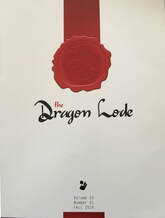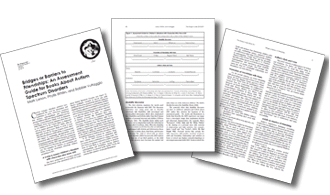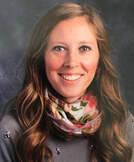|
About the Journal
The Dragon Lode (ISSN 1098-6448), a juried journal, is published twice a year by the International Literacy Association Children’s Literature and Reading Special Interest Group (CL/R SIG). Members of the CL/R SIG receive two (2) issues of The Dragon Lode each year. The Dragon Lode provides readers with a forum for exchange of ideas concerning the content and teaching of children’s literature in the development of literacy. |
EditorsContact the Editors at [email protected] |
|
Call for Manuscripts
As editors of The Dragon Lode we invite all those interested in bringing children and their literature together to submit articles for publication in future issues. We request scholarly articles of interest to teachers, librarians, researchers, and authors, practical ones grounded in current theory and research, or teaching strategies as they relate to Children’s Literature in the Classroom, Home- School Connection, Bridges to Content Knowledge, Current Issues in Children’s Literature and Reading, Exploration of Authors and Illustrators, and Special Themes.
Fall 2024 - Open Theme
Submission Deadline - July 31, 2024
We invite manuscripts that explore contemporary issues and questions, genre study, literary theory, and research related to children’s literature and reading.
Spring 2023 - Open Theme
Submission Deadline - January 31, 2024
We invite manuscripts that explore contemporary issues and questions, genre study, literary theory, and research related to children’s literature and reading.
Fall 2023 - Books as Forms of Resistance
Submission Deadline - July 31, 2023
Humans have long organized protests and other forms of nonviolent resistance to effect change. In fact, early texts document the social struggle to overcome power imbalances between monarchies and laypeople. These types of power struggles continue today through protests that highlight the inherent societal injustices throughout the world. These acts have improved working conditions and environmental protection measures, and sparked global reckonings after the murders of George Floyd and Mahsa Amini.
While protests have been used to effect change, individuals and groups have historically used book burning, bans, and challenges to suppress information--recognizing the inherent power of literature to cultivate ideas and transform society. We find ourselves in a time of unprecedented levels of book challenges as advocacy organizations work to strategically ban books. In fact, over 2,500 book titles were challenged in the 2021-22 school year, a level not seen in decades according to a report by the group PEN America. With the growing number of coordinated efforts to remove lists of books from school and public libraries, reading lists, and classrooms, we question how do we respond to these challenges and more importantly how do we use books as forms of resistance?
In this issue, we ask you to explore Books as Forms of Resistance. We invite you to consider the following questions:
Fall 2024 - Open Theme
Submission Deadline - July 31, 2024
We invite manuscripts that explore contemporary issues and questions, genre study, literary theory, and research related to children’s literature and reading.
Spring 2023 - Open Theme
Submission Deadline - January 31, 2024
We invite manuscripts that explore contemporary issues and questions, genre study, literary theory, and research related to children’s literature and reading.
Fall 2023 - Books as Forms of Resistance
Submission Deadline - July 31, 2023
Humans have long organized protests and other forms of nonviolent resistance to effect change. In fact, early texts document the social struggle to overcome power imbalances between monarchies and laypeople. These types of power struggles continue today through protests that highlight the inherent societal injustices throughout the world. These acts have improved working conditions and environmental protection measures, and sparked global reckonings after the murders of George Floyd and Mahsa Amini.
While protests have been used to effect change, individuals and groups have historically used book burning, bans, and challenges to suppress information--recognizing the inherent power of literature to cultivate ideas and transform society. We find ourselves in a time of unprecedented levels of book challenges as advocacy organizations work to strategically ban books. In fact, over 2,500 book titles were challenged in the 2021-22 school year, a level not seen in decades according to a report by the group PEN America. With the growing number of coordinated efforts to remove lists of books from school and public libraries, reading lists, and classrooms, we question how do we respond to these challenges and more importantly how do we use books as forms of resistance?
In this issue, we ask you to explore Books as Forms of Resistance. We invite you to consider the following questions:
- How does your relationship with challenged books inform your pedagogy, instruction, text selection, and inclusion in your classroom/school library?
- How have you used books as a form of resistance? How do you use books to protest or resist dominant cultural norms, racism, oppression, and inequality?
- How do you use books to challenge your perspective, your students’ perspectives, and/or socially constructed realities in order to effect change?
- How can teacher educators prepare preservice teachers to address book challenges in their future classrooms? And how can they prepare preservice teachers to effect change through teaching literature?
Manuscript Guidelines
Manuscripts must be submitted electronically and should be no longer than 20 double-spaced, typed pages. Use APA (7th edition) formatting. Author’s name, affiliation, mailing address, telephone and fax numbers, and e-mail address should be on a separate cover page. Please be judicious in the use of tables, photographs and charts. Book covers, photographs, illustrations and figures should be sent as separate jpeg files. Any reference to the author that would enable the reviewer to know the author’s identity should not appear in the manuscript.
Email manuscripts to: The Dragon Lode [email protected]
Email manuscripts to: The Dragon Lode [email protected]




